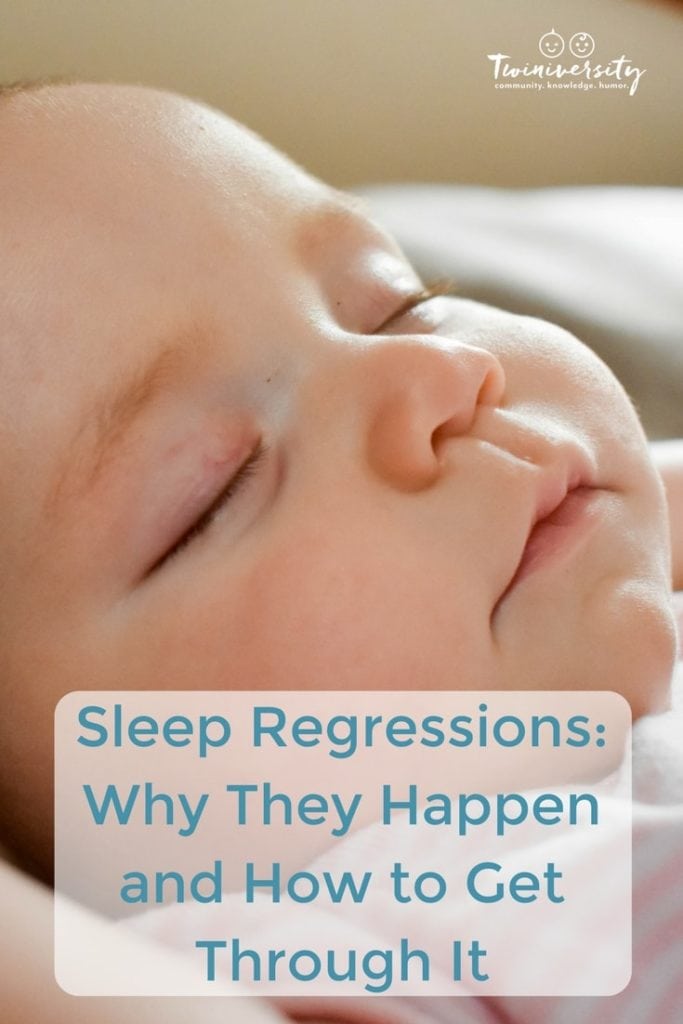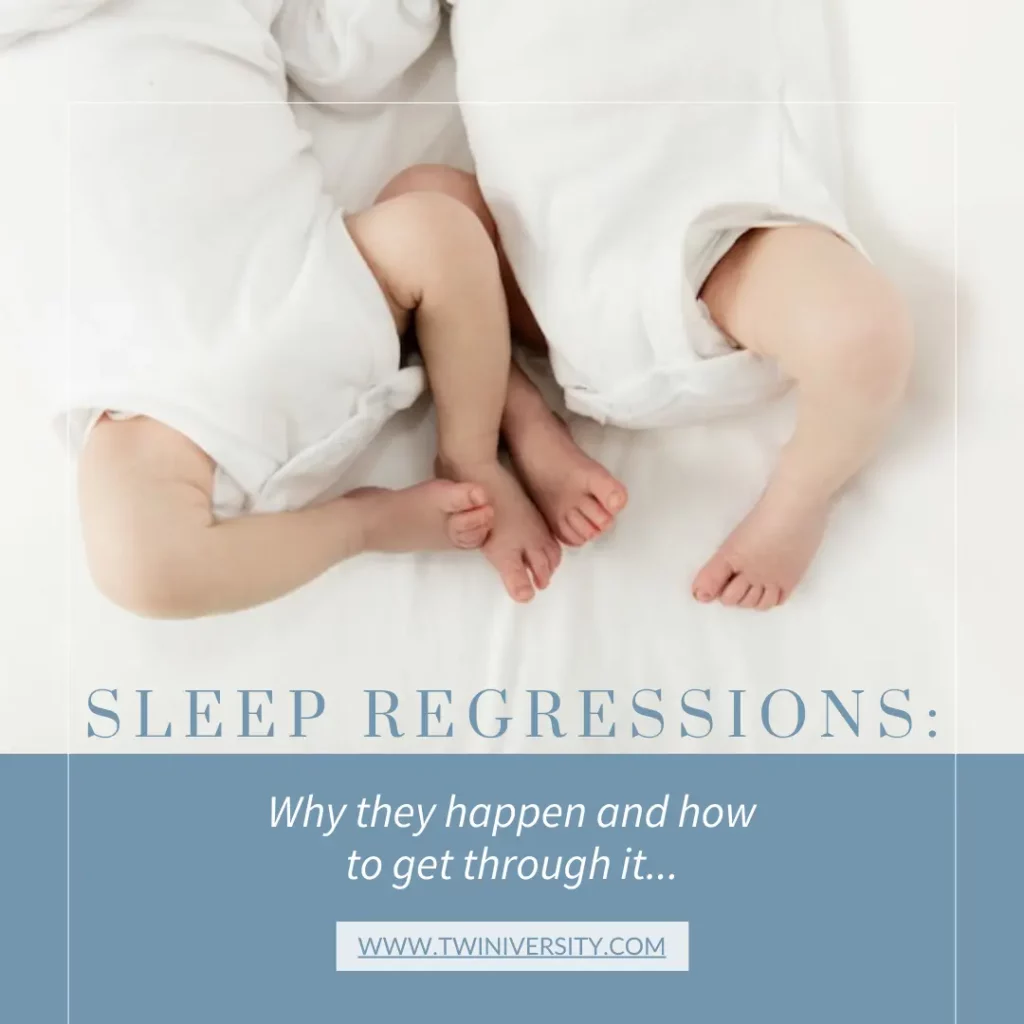Last updated on January 25th, 2024 at 12:54 pm
When my twins were born, I received several adorable baby books for scrapbooking and memorializing tender moments and milestones. I’m sorry to admit it. I don’t use them because, well…..twins. I really tried. But between exhausting days in the NICU and exhausting nights, once the twins came home, the books were quickly forgotten. Luckily, Facebook’s “On This Day” feature exists to remind me of sweet photos and hilarious moments that I documented online.
Looking at Facebook not too long ago, I came across a post I’d written when the twins were about 15 months old. It read “I hate all of you who knew about sleep regression and didn’t warn me about it”. That simple sentence brought back waves of memories and feelings of frustration, confusion, and defeat. And exhaustion. Mostly exhaustion. Sleep regression is a baffling phenomenon, but it is survivable.
So, what exactly is sleep regression? Basically, it’s a stage when your baby or toddler who has been sleeping well suddenly starts waking at night and/or skipping naps (or waking early from naps) for no apparent reason. It comes out of the blue and can affect even the most perfectly sleep-trained children. I spoke to my children’s pediatrician and several nurses and spent many desperate hours online trying to find answers, and I’ve just given you the summary of what those sources could tell me.
The good news is that it doesn’t affect all kids. My son experienced sleep regression, but my daughter did not. In fact, no parents in my life had even heard of it. When I wrote that angry Facebook post, I had dozens of perplexed responses from friends and relatives. After weeks of talking about it, one of my coworkers mentioned that a cousin of hers had posted on Facebook that her child was going through it, and no one in her life had heard of it either. So it may be that it’s a rare stage, and your family may never need to deal with it.

If your family does have to deal with sleep regression, however, know that the specifics of the experience may vary wildly. Most medical sites on the internet indicate that sleep regression commonly occurs when children are four months old, eight months old, and two years old and can last between two and six weeks. Some children may suddenly stop napping. My son is now almost four years old, and his one and only regression began at 15 months and lasted about three months. It also came on completely out of the blue one night. We put him to bed as we always did, and he slept through the night, and the next night, he screamed uncontrollably all night long. Over the next three months, he began to sleep more at night until, eventually, he was sleeping through the night again.
Sleep regression is a normal developmental stage, though it can leave parents feeling helpless. Watching your child scream inconsolably through the night is always frightening. Our pediatrician reassured us that as long as our son was sleeping at some point –and he was napping regularly—then he was fine. Towards the end of his three-month regression we did ask for a referral to a sleep specialist, but by the time the appointment was scheduled, our dark nights of terror had ended.
If your child experiences a regression, consult with your pediatrician to be certain that it is indeed a regression and not something more serious. The following strategies helped us survive and could help you as well:
Plan for a lack of sleep
It’s inevitable that you will have sleepless nights, so do your best to plan ahead. My husband and I both worked full-time, but we would alternate nights staying up with our son while the other parent slept. Though we were sleep-deprived, it helped to know that we’d get a full night’s sleep the next night. We would adjust that schedule if one of us had an important meeting or presentation the next day.

Try sleeping in different areas
After about 4 days of not sleeping, we made a bizarre discovery: our son wouldn’t sleep in his crib, our bed, or being held in a chair, but he’d sleep on our cold, hard family room floor. So each night, either my husband or I would settle down on that floor next to our son. After a couple of weeks, we were able to leave our son sleeping on the floor while we slept next to him on the couch, which was heavenly on our aching bones. We’ve never figured out why our son would calm down and doze on such an uncomfortable surface, but it worked. Keep trying with your own children until you find something that works for you, but be sure to always make sleep safety the top priority.
Let naps become your priority
If you’re a stay-at-home parent, let the laundry and dishes pile up and nap when the kids nap. If you work outside of the home, get in a quick nap at lunch if you can or as soon as you get home. On the weekends, trade off naps with your partner. If you’re a single parent, hire a babysitter or have a relative or friend watch the kids for a bit so you can doze. You’re going to be operating on very little sleep, which can be dangerous for everyone, so there’s no shame in getting sleep wherever or whenever you can.
Try not to form bad habits
In our desperation to find a solution to the regression, we moved our son’s crib from the twins’ room into our own bedroom. It took a very long time to get that crib out again. Months after the regression ended, our son was still sleeping in our room, and our daughter became upset that she was alone in her own bedroom.

Know that this too will pass
In those sleep-deprived moments when you fear you’re losing your grip on your sanity, keep in mind that the regression is only temporary. Like all of the challenges we face as parents—teething, potty training, driver’s ed –it will seem endless and hopeless, but within a few days or weeks, your child will be sleeping again. Cry, vent, or pray to get through it. You WILL get through it, though—you’re a parent of twins, after all!

Dawn Krzisnik is the bemused mother of 3-year-old boy/girl twins, Evelyn and Holden. She is married to David, a high school teacher and children’s book author. She lives in Michigan with her family and her Toy Manchester Terrier, Scout. Dawn recently left her job as a project manager to stay at home full-time with her twins. In a previous life, she worked as a marriage, family, and child therapist for community mental health agencies. Dawn writes about parenting and other exciting, yet challenging, life transitions at www.Twinsition.com.
Related Articles
Top 10 Sleep Tips for Newborn Twins








